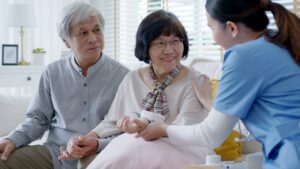There comes a time when we all need help, when fiercely independent, aging parents are no longer up to the tasks that living safely and independently require. We, their kids, try to find and hire an agency to care for our parents. We try to stay involved, but many of us have busy lives of our own. Because we have hired someone, it becomes easier to rely on them more and more. Maybe we don’t check in as often. Maybe we don’t visit as often, especially if we live far away.
Thus, we are often in the dark about the day to day well-being of our parent(s) and hope for the best. Except for those occasional – daily or weekly – calls from our caregiver or their agency, we are out of the loop. Or, we call and want to know how things are going, how Mom or Dad is doing, etc., possibly interrupting the caregiver, getting in their way.
What if there was a way for us to not only stay better engaged, but also create more meaningful moments for our loved ones?
What if we could be as in-the-know as we want? What if we could easily make sure that our parents are taken care of in the way THEY want, even if we are far away and not with them day to day? What if there was a way to let caregivers know how Mom likes her hair styled, the types of outfits she prefers, how she likes her eggs, the types of exercises she likes and needs to do, and the caregiver(s) – whether the caregiver has been with her for a long time or is brand new – had this information at their fingertips and not in one caregiver’s memory or a binder on the dining room table?
Increasingly, research shows the correlation between social connection interaction and mental and physical health outcomes. These findings are particularly relevant to seniors, especially as they have fewer relationships/interactions, increasingly live alone, have mobility challenges, and may be uncomfortable reaching out to people/community proactively. Their isolation often adds to our worries about our parents. Keeping our loved ones physically safe is not enough and we need to also ensure their mental and emotional well-being.
What if we could help to address this challenge, if even from afar?
What if we could better engage other family members and friends in the care of our loved ones? Those who live nearby can stop by for a coffee, take her out for a stroll (if able) or play a card game together. Those who are remote can have a video call for a quick chat. There is a role for a professional caregiver and there are roles many of us can also take in supporting the wellness of our loved ones.
There are many ways to be involved in the lives of our parents – and other seniors in our lives – as they age and to help the process be graceful, as well as healthy as possible physically, mentally and emotionally.
What might creating more meaningful moments for your loved ones look like for you?
Team Mariposa



